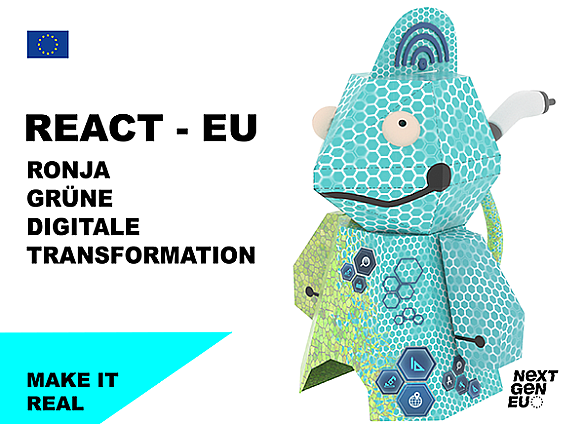Via the REACT-EU recovery assistance, the European Union is providing an additional €50.6 billion in funding to mitigate the repercussions of the COVID-19 pandemic. REACT-EU provides recovery assistance for cohesion and for Europe’s regions, and is the second-largest funding instrument in the context of NextGenerationEU.
The REACT-EU funding is being implemented under the framework of the structural funds programmes of the 2014-2020 programming period in an ambitious timetable covering the years from 2021-2023.
This means that the ERDF will also be able to offer targeted measures to help Bremen cope with the economic impact of the COVID-19 pandemic.

NGEU pools the European Union’s measures to tackle the economic and social consequences of the COVID-19 pandemic. The unprecedented instrument in the history of the European Union disposes of more than €800 billion in funding.
The measures funded from it not only tackle the direct effects of the pandemic, but also build bridges to the future so that Europe can emerge stronger from the crisis, equipped to face up to future challenges.
NGEU consists of a total of seven individual instruments which support businesses and the people in the EU via specific measures targeting a variety of priorities:
| Instrument | Amount |
|---|---|
| Recovery and Resilience Facility | €723.8 billion |
| of which loans | €385.8 billion |
| of which grants | €338.0 billion |
| REACT-EU | €50.6 billion |
| Horizon Europe | €5.4 billion |
| InvestEU | €6.1 billion |
| Rural development | €8.1 billion |
| Just Transition Fund | €10.9 billion |
| RescEU | €2.0 billion |
| TOTAL | €806.9 billion |
Germany is receiving €2.4 billion of REACT-EU funding. €25 million of this is allocated to the ERDF in Bremen.
In order to be able to receive and spend the REACT-EU funding, the ERDF managing authority applied for a change to the ongoing 2014-2020 ERDF programme, and this was given the official seal of approval by the European Commission on 3 August 2021. The additional EU funding is being made available to the ERDF for the remaining period of the current 2014-2020 programming period, and must be used and fully disbursed to the beneficiaries by the end of 2023.
The measures envisaged for the REACT-EU funding are being programmed in a new, separate Priority Axis 6 entitled Crisis management and transformation to a greener and digital economy. The managing authority has embarked on the necessary preparations to implement the new programme axis. This means that the REACT-EU assistance can soon be rolled out in Bremen.
The envisaged funding priorities are strengthening research and innovation for a greener and digital economy and the digitisation/pandemic resilience in particular of the events infrastructure. The EU funding is to go firstly towards research projects in the field of aerospace (eco-efficient flight, use of hydrogen, lightweighting) and towards environmental innovations (green mobility, resource protection and climate action), as well as towards the expansion of infrastructural facilities and transfer centres for research.
At the same time, there are plans to fund the digitisation of the administration and the expansion of the startup assistant as a service portal for new entrepreneurs/SMEs. Support is also to go towards sustainable and digital public administrative infrastructure, including investment in Wi-Fi, new reservation systems and visitor management.
Changed, aktual ERDF-Programm Bremen 2014-2020 with REACT-EU (pdf, 728.9 KB)
EU-Page REACT-EU
EU-Page NextGenerationEU
Press release on the agreement on REACT-EU reconstruction aid
REACT-EU Ordinance of 23.12.2020 (pdf, 594.6 KB)

Ronja the chameleon is our new REACT representative for the fields of the digital and green transition. We already have a modelling sheet for Ronja. Feel free to download it and try it out!